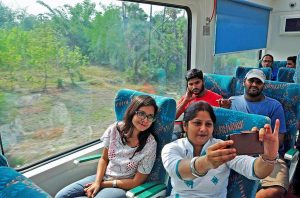
Rise of eco-friendly initiatives in transportation, focusing on trains.
Introduction to Electric Vehicle (EV) train coaches as a part of this green initiative.
The importance of EV train coaches for eco-friendly travel, comfort, and future rail travel sustainability.
- Understanding EV Train Coaches
Definition and Overview: What EV train coaches are and how they differ from traditional train cars.
Design and Functionality: Unique structural and functional aspects of EV coaches.
Technology and Power Source: Overview of the electric motor, battery, or hybrid systems powering these trains, comparing these to other types of rail engines (like diesel and steam).
Types of EV Coaches:
EV1 and EV2 Coaches: Define each coach type, highlighting their differences and unique attributes.
Other Variants (e.g., VistaDome): Discuss other specialized EV coach types and their intended uses.
- Routes and Cities Covered by EV Train Coaches
Popular Routes: Routes where EV coaches are primarily used, with examples from regions or countries prioritizing eco-friendly train travel.
International Deployment: Countries and regions leading in EV coach adoption.
Case Studies of Specific Routes:
Notable routes in Europe, Asia, and the U.S. where EV coaches are prominent.
Describe landscapes and highlights for each route.
- Features and Amenities in EV Coaches
Passenger Comfort: How EV coaches are designed to enhance passenger comfort through reduced noise, smoother rides, and air quality improvements.
Eco-Friendly Interiors: Sustainable materials used in EV coaches, including seating, flooring, and lighting.
Modern Amenities:
Charging Stations: Availability and convenience of power outlets for devices.
Wi-Fi Connectivity: Seamless internet for remote work and entertainment.
Panoramic Windows (if applicable): For scenic routes, where coaches like VistaDome offer a unique viewing experience.
Accessibility: Design aspects that make EV coaches more accessible for elderly passengers, people with disabilities, and families with young children.
- Environmental Impact of EV Train Coaches
Lower Carbon Emissions: Discuss how electric trains reduce carbon emissions compared to diesel trains.
Energy Efficiency: EV coaches’ ability to utilize regenerative braking and other energy-saving techniques.
Reduced Noise Pollution: Benefits of quiet, electric-powered travel for communities near train routes.
Government Initiatives and Policies: A look at policies encouraging the shift to EV coaches, such as subsidies or green certifications.
- Technological Innovations Driving EV Train Coaches
Battery Technology: How advancements in battery technology have made electric trains feasible for longer routes.
Regenerative Braking: An explanation of how this technology recovers energy and reduces energy costs.
AI and Automation: How AI assists with route optimization, energy management, and autonomous operations.
Solar-Powered Options: Trains that incorporate solar panels on rooftops or use solar energy for part of their power needs.
- Challenges and Limitations of EV Train Coaches
Battery Limitations: Range issues on long-haul routes and reliance on charging infrastructure.
Infrastructure Requirements: Challenges in developing charging stations and adapting existing tracks for EV coaches.
Cost Implications: The high costs associated with EV train manufacturing, infrastructure, and maintenance.
Weather and Terrain: Limitations of EV coaches in extreme weather conditions and challenging terrains.
- Future Prospects and Innovations
Hybrid Systems: Potential for hybrid coaches that combine electric and alternative power sources.
Wireless Charging: Prospective technology for wirelessly charging EV trains on the go.
Global Expansion and Market Trends: The growth of EV train markets in Europe, Asia, and North America.
Sustainability and Net Zero Goals: How EV train coaches align with international sustainability goals and carbon neutrality targets.
Summary of EV coaches’ impact on rail travel, the environment, and passenger comfort.
Reflection on the role of EV coaches in achieving a sustainable future.
Final thoughts on the adoption of EV technology in public transportation and the promising future of rail travel.

Leave a Reply